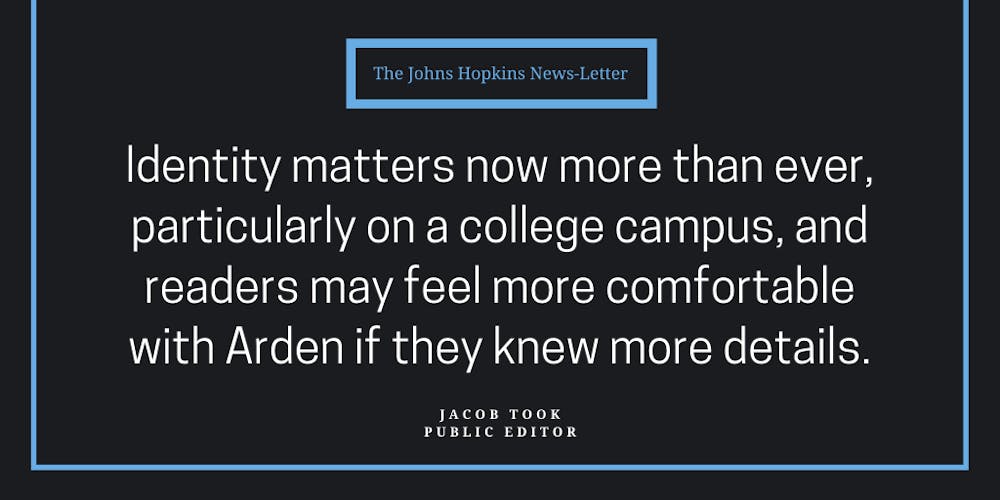
You may have noticed an unusual byline in last week’s Voices section — Arden Arquette, a name laden with literary whimsy, appeared beneath a silhouetted headshot. Read the title, ‘Ask Arden,’ and the pieces come together — The News-Letter has an anonymous advice column.
Arden sticks out from the section’s usual range of wit, self-reflection and delicious Italian recipes. An advice column speaks directly to readers, drawing from their submitted questions and supposing to offer tips and tricks for mastering life at Hopkins and beyond. Don’t get me wrong — other columnists speak to readers through being open with their own perspectives and experiences. Arden, though, literally creates a conversation on the page.
Unlike other sections of the paper, Voices is explicitly structured to represent the range of student voices on campus. Readers come to these pages (A8 and A9, for everyone counting at home) in hopes of finding something relatable in the experiences of their fellow Blue Jays, or to learn something new from a perspective they don’t hear too often. It’s a prime spot to open up engagement with readers.
I asked Voices Editor Sam Farrar to pull back the curtain and reveal a bit more about Arden, as well as his approach to editing an anonymous advice column. He explained that he might end up editing Arden a tad more closely than his other writers.
“With a normal column, it’s all about self-reflection, and I’m not in a place to be the authority on how those writers should process anything they’re thinking about,” he said. “There is a little more responsibility that comes along with an advice column, because the people asking questions are making themselves vulnerable in a certain way.”
Now, readers who submit questions will also remain anonymous, even to Arden themself. That said, writers and editors must mind their language and take care to make the paper an inviting space for readers. That care is all the more important while scrutinizing a single reader’s question in print.
Farrar shared confidence that Arden would draw readers in, respect the sensitivities of their questions, navigate roughly 800 words of advice and leave them awaiting Arden’s return. Which raises the question: who is Arden Arquette?
Excited as I was to see the column’s debut last week, I was surprised not to find a more thorough introduction.
Farrar explained that he felt it best to let Arden get right down to business, introducing themself to readers through their distinct voice and the personal experiences from which they draw their advice.
“A lot of popular or famous advice columns do have a kind of ethos around the character that they build, but I thought the best way to do that would not be to establish it at the beginning of the first column,” he said. “That’s something that’s going to build itself as they continue to write.”
With a limited number of weeks left before the semester ends (yep, already time to think about the end of the semester), Farrar’s judgement seems more than fair. That being said, without a proper introduction, will readers want to let Arden in on their vulnerabilities?
Most popular advice columns, anonymous or otherwise, begin at the beginning. There’s no want for examples online — self-help really is a billion-dollar American industry, and the helpers introduce themselves in different ways depending on where you read.
‘Dear Sugar,’ the legendary column from The Rumpus, opened with an FAQ and all the dry irreverence that garnered the then-anonymous columnist such a formidable following. Slate’s ‘Gentleman Scholar’ kicks off with a warm welcome. And when writers hand off, they usually take time to reintroduce themselves — see K. Anthony Appiah’s thoughts on taking over ‘The Ethicist’ at The New York Times, or the full-on chat between the outgoing and incoming writers when ‘Dear Prudence’ (another Slate favorite) most recently changed hands.
Farrar didn’t want to sacrifice too much print space to introduce an alias, particularly when the writer could get right to work digging into reader questions. Why not do something like Ask Bear from Bitch Media and pop a little bio at the top of each piece? This helps readers get to know Arden while the column is starting out, and also helps orient readers who may have stumbled upon Arden while searching for real students.
Anonymity raises other concerns, though. Identity matters now more than ever, particularly on a college campus, and readers may feel more comfortable with Arden if they knew more details. Readers might question whether Arden can speak with authority on their concerns.
There’s no easy answer, but drawing from personal experience and leaning into their own vulnerabilities will help Arden build trust with readers and create an open, honest dialogue. In this process, Arden may also give away something about where they’re coming from (having already mentioned their sorority in their first column’s opening paragraph).
Arden isn’t the first anonymous columnist who’s taken up their pen in the good fight to resolve the queries and quandaries of confused, stressed-out and at times desperate Hopkins students. Dedicated readers may remember Jenny Hopkins, who penned a series back in 2017 exploring anxieties around change, homesickness and wet dreams.
I’m not going to unmask Arden — that would ruin the fun. But I’ll unmask Jenny now: Morgan Ome, an editorial fellow at The Atlantic and former News-Letter Editor-in-Chief, explained to me that she wanted to create a safe space and a resource where readers could seek advice, one Hopkins student to another.
“That’s something cool about The News-Letter — it’s not like you’re bringing in an expert or a professional writer. It’s a student,” she said. “What gives someone the authority to offer that advice? Nothing, really. But also, they’re a student. They have similar experiences. I think there’s merit in that.”
Photography Editor Eda Incekara, also a peer listener at student-led peer listening service A Place To Talk, agreed with Ome that the anonymous advice column could be a valuable resource for readers at Hopkins. She explained that protecting the anonymity of the writer and readers could help both sides of the dialogue feel more comfortable sharing personal experiences.
“Personally, I feel more comfortable in some talking about personal issues with — not exactly strangers on the internet,” she said with a laugh, before elaborating. “People won’t tie your own self to your actions, because they won’t know who you are, and that brings a sense of freedom in some people. They become more comfortable expressing what they truly feel because they’re not fearing other people’s judgement.”
If reading this reminded you of a weight you’ve been carrying on your shoulders, consider sharing your stressors with The News-Letter — maybe you’ll get some unexpected insight that changes your whole worldview. Thanks Arden.
We want you to be part of this conversation! We encourage our readers to email publiceditor@jhunewsletter.com with questions or comments about our practices and published content.





